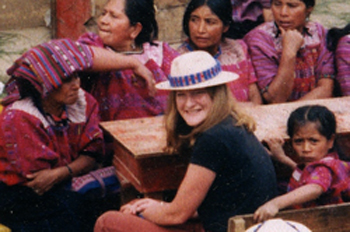By (October 27, 2008)
Burrell: Understanding Central America Vital to U.S.
 |
| Anthropologist Jennifer Burrell is researching Central American and Mexican migrant workers in the Capital Region, including examining migratory flows and local access to health care among migrants in restaurants, farms, and the Saratoga race track (Photo Courtesy Jennifer Burrell). |
In 2007, she began research on Central American and Mexico migrant workers in the Capital Region with colleagues at UAlbany and Universidad Iberoamericana in Mexico. The project examines economic strategies, migratory flows and local access to health care among migrants in restaurants, farms, and the Saratoga race track.
"Central America is an area of the world that is critically important, especially in relationship to the United States," said Burrell. "First, the region functioned as the site of experiments in democracy that inform current U.S. actions in other parts of the world. Second, Central America is the homeland of millions of wage-labor migrants now working in the United States."
Burrell said that knowing the recent history of these migrants and the reasons they leave their homes in search of jobs in the U.S. is central to any kind of regional geopolitical understanding. "Indeed, so many Mexican and Central American migrants are now in the U.S. that it is possible to argue that 'Central America is here,' " she said.
Burrell's project is funded by Programa de Investigacion de Migracion y Salud (PIMSA).
The University at Albany was recently the site of an international gathering of experts on democracy and transition to democracy in Central America.
Burrell of the Department of Anthropology organized "After the Handshakes: Rethinking Democracy and Living Transition in Central America," with Ellen Moodie of the University of Illinois. The workshop was funded by the Wenner Gren Foundation for Anthropological Research and various grants from UAlbany and the University of Illinois.
Twenty experts from the U.S., Europe, and Central America participated, as well as three generations of UAlbany specialists on the region.
Robert Carmack, founder of UAlbany's Institute for Mesoamerican Studies (IMS), current faculty members Burrell and Walter Little, and Claudia Dary, who recently received her doctorate in anthropology and now works as a researcher in Guatemala, all participated. IMS has been influential in training scholars to work in Central America.
Guest speakers included Dr. Ciska Raventos, head of Social Sciences Faculty at the University of Costa Rica and a leader of the anti-CAFTA movement there. Raventos spoke about her organizing work in relation to electoral practices in Costa Rica. Dr. Leigh Binford of Universidad Benmerita de Puebla spoke about his return to El Salvador after more than a decade. In the 1990s, he researched the investigation of the massacre at El Mozote. Marc Edelman, a specialist on Central American peasant movements, and Florence Babb, who works on tourism and gender in the region, also took part.
mediarelations@uamail.albany.edu
